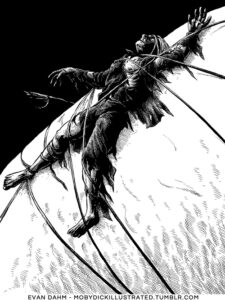Good Friday
Easter. Images of Pope Francis performing the “foot washing” ritual, – a reminder of Easter as a religious commemoration… That was yesterday, Maundy Thursday. The image reminds me that Christianity promotes servility. Is there any evolutionary advantage to servility? Are the survival odds of one’s fellowman improved?
I think, offering to others the self-that-I-am at this given moment, and responding mindfully to the disclosure of self by others is the best that you and I can manage. Anything else is illusion, even the Christian charade of humility. What do you think?
I reviewed passages from Herman Melville’s Moby Dick. Years have passed since I read the tale. I vaguely remembered that Ahab’s mono-maniacal pursuit of the great white whale impressed me as a metaphor for our human condition. We all together, are in this thing called life are we not? Homo Sapiens are social, herd mammals. You and I, crew-members on the ship Pequod, Starbuck our first mate, all obeying old Ahab who follows his fate and ours, to pursue and to conqueror Moby Dick.
They were one man, not thirty. For as the one ship that held them all;
though it was put together of all contrasting things- oak, and maple, and
pine wood; iron, and pitch, and hemp- yet all these ran into each other in
the one concrete hull, which shot on its way, both balanced and directed
by the long central keel; even so, all the individualities of the crew, this
man’s valor, that man’s fear; guilt and guiltiness, all varieties were
welded into oneness, and were all directed to that fatal goal which Ahab
their one lord and keel did point to.
— excerpt Moby Dick by Herman Melville, chapt. 134
Melville’s language is cinematic is it not? The author says in a few lines what an entire textbook on philosophy could not say with as much precision, and as much elan.
There is a resurrection of sorts in this story which interests me.
On the second day of the chase and engagement with the white whale, upon returning to the ship a head count is taken. A crew member is missing. Fedallah, the Zoroastrian crew member is nowhere to be found on the ship. Fedallah is the non-Christian outsider among the crew. Apparently in the melee to harpoon the whale, The Parsee was caught in the line of Ahab’s hurled harpoon.
“Aye, sir,” said Stubb- “caught among the tangles of your line- I thought
I saw him dragging under.”
“My line! my line? Gone?- gone? What means that little word?– What
death-knell rings in it, that old Ahab shakes as if he were the belfry. The
harpoon, too!- toss over the litter there,- d’ye see it?- the forged iron,
men, the white whale’s- no, no, no,- listered fool! this hand did dart it!–
‘tis in the fish!- Aloft there! Keep him nailed-Quick!- all hands to the
rigging of the boats- collect the oars- harpooneers! the irons, the irons!-
hoist royals higher- a pull on all the sheets!- helm there! steady, steady
for your life! I’ll ten times girdle the unmeasured globe; yea and dive
straight through it, but I’ll slay him yet!
— excerpt Moby Dick by Herman Melville, chapt. 134
Ahab is horrified that he has inadvertently been the agent of death of a crew member. Yet, the awful disappearance of Fedallah only intensifies Ahab’s emotional frenzy to pay any price to slay the whale.
 The Parsee appears again on the third and final day of the pursuit of Moby Dick.
The Parsee appears again on the third and final day of the pursuit of Moby Dick.
…and as the whale swimming out from them, turned, and showed one entire flank
as he shot by them again; at that moment a quick cry went up. Lashed
round and round to the fish’s back; pinioned in the turns upon turns in
which, during the past night, the whale had reeled the involutions of the
lines around him, the half torn body of the Parsee was seen; his sable
raiment frayed to shreds; his distended eyes turned full upon old Ahab.
The harpoon dropped from his hand.
“Befooled, befooled!”- drawing in a long lean breath- “Aye, Parsee! I
see thee again.- Aye, and thou goest before; and this, this then is the
hearse that thou didst promise.
— excerpt Moby Dick by Herman Melville, chapt. 135
A resurrection indeed.
That’s all I have to say about Easter.